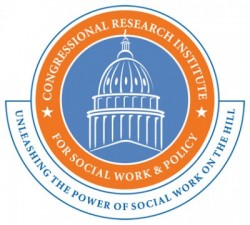The 12 Grand Challenges for Social Work as envisioned by the American Academy of Social Work and Social Welfare (AASWSW) has galvanized a significant number of social workers—not all, but mostly academics—around the notion that sustained focus on key issues relevant to creating and maintaining a just society for all people can be pushed in that direction with leadership from the social work profession.
The gathering at the Brown School last week advanced that idea with details from the 12 issue groups who made presentations and several panels of experts—some not social workers—who offered their perspectives on the endeavor and ideas that could broaden its appeal.

Dr. Michael Sherraden, Director of the Center for Social Development at the George Warren Brown School of Social Work
Kudos to policy scholar Michael Sherraden and the Center for Social Development at the George Warren Brown School of Social Work for his leadership in organizing the conference that drew many notable social work scholars. It was a signature event in the nascent deanship of the inimitable Mary Mckay who displayed her usual grace and style. She took pride in informing the dinner audience that Washington University Chancellor Mark Wrighton and Provost Holden Thorp were watching the livestream in Hong Kong, quite impressive because of the different time zones. The forum also featured an impressive array of upcoming social work scholars. I was particularly impressed with Carrie Pettus-Davis, an assistant professor at the Brown School and founding director of the Concordance Institute for Advancing Social Justice and co-founder and co-director of the Smart Decarceration Initiative.
Several overarching themes emerged from the conference. One is to recognize the undertaking is indeed grand: ensure healthy development for all youth, end homelessness, reduce extreme economic inequality, and stop family violence are herculean tasks that are daunting challenges far beyond the ability of social workers alone to effectuate. Several speakers urged the leaders to expand their outreach to other disciplines. Another theme that resonated through the conference was the need to avoid working in silos—there is obvious synergy across several of the challenges and these should be given adequate attention. A third theme that surfaced is the need to create space for the voices of students and community residents. Brown School endowed professor Sarah Gehlert emphasized the need to train social work students in translational research and other approaches needed to advance this work.
This conference was nirvana for policy wonks. The information presented by panelists, and questions posed by participants were relevant and thought-provoking. Friday sessions were the highlight of the conference for me. The Fund for Policy Education and Practice Executive Director Pat White emphasized the need to examine each of the challenges through the lens of race, equity and social justice. University of Southern California School of Social Work Dean Marilyn Flynn stressed the need to be innovative in our thinking about how Grand Challenge groups relate to each other and pressed for the inclusion of non-social work students in this effort to influence policy. The venerable Brookings Institution scholar Isabel Sawhill expressed the need for an overarching grand vision for the Grand Challenges and suggested the question: “How do we create a society that enables everyone to achieve their full potential and ensures that everyone is cared for when needed.”
One of the non-social work presenters, Dedrick Asante-Muhammad with the Corporation for Enterprise Development, shared a few poignant lessons learned from his work on racial economic inequality and one is messaging—finding a way to describe the Grand Challenges so everyday people can understand. Another is to address the myths that perpetuate the problems that are being tackled. For example, there are many who believe efforts to reduce incarceration will work against public safety because we are letting dangerous people out of prison. However, research shows that incarceration often leads to increases in criminalizing behaviors and less safety.
Social workers will be hearing much more about the 12 Grand Challenges over the next decade which is the target time for having a significant impact on policy. Social work organizations, schools and departments are encouraged to include the Grand Challenges in their programming so there are likely to be numerous events in the coming months featuring this work. AASWSW founding president University of Maryland School of Social Work Dean Richard Barth has been nurturing the 12 Grand Challenges idea for half a decade and is now witnessing real traction. The high-profile presence of NASW CEO Angelo McClain underscored the need to move this effort beyond the academic realm. The potential seems great. We heard that word many times during the conference. Time will tell how much of our potential is realized.
The post 12 Grand Challenges Gain Momentum at Brown School Forum appeared first on Congressional Research Institute for Social Work and Policy.
Written By Charles E. Lewis Jr., Ph.D
12 Grand Challenges Gain Momentum at Brown School Forum was originally published @ Charles Lewis – Congressional Research Institute for Social Work and Policy and has been syndicated with permission.
Our authors want to hear from you! Click to leave a comment
Related Posts






